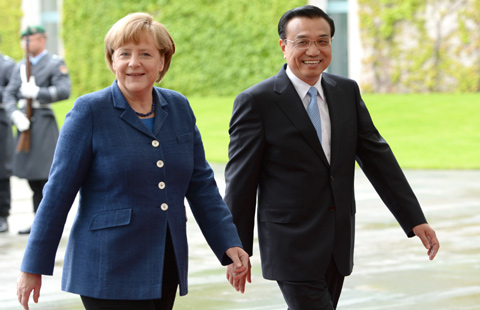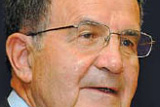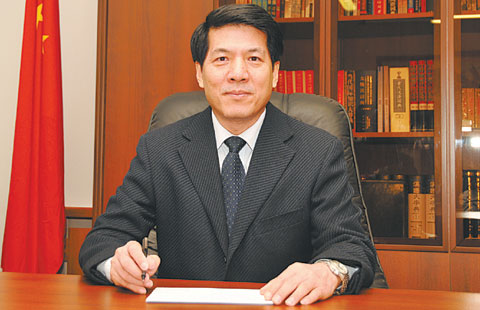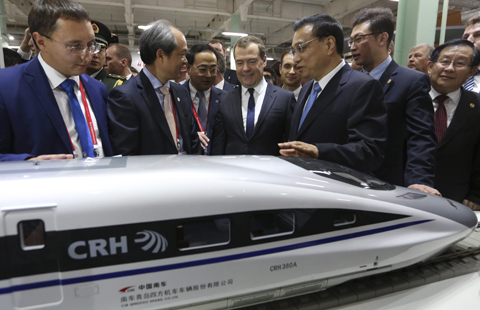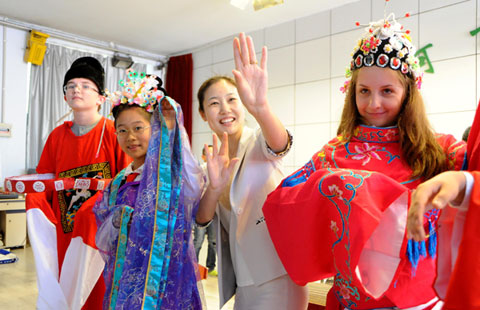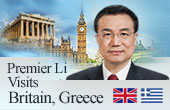Premier to get down to nuts and bolts
Silk Road project likely to be widely discussed at Asia-Europe meeting
Premier Li Keqiang is expected to call for closer, pragmatic collaboration between Asian and European countries to turn China's idea of building a Silk Road economic corridor into a reality.
Insiders say China is determined to inject a strong dose of reality into the Asia-Europe Meeting by proposing to build cross-border railways and roads to better connect countries on the two continents.
In recent years China has been working on ways to allow its cargo trains to run to Italy, Germany and Spain, and it is ready to build more roads to link its neighbors.
When Li attends the 10th summit of ASEM in Milan over two days from October 16 after he visits Germany, Russia and Italy, he will be talking of such ideas to stimulate the region's economy and connect the countries more closely, says one insider who is close to ASEM organizers.
China's proposals are expected to be warmly welcomed given ASEM's need for creative new ideas.
Shada Islam, policy director of Friends of Europe in Brussels, says China, as Asia's fastest-growing economy, has a special responsibility in ASEM and she looks forward to a stronger Chinese leadership role in the meeting.
"Of course such an idea will not and cannot be implemented immediately," says Islam, referring to China's Silk Road economic corridor initiative.
"It is a big and ambitious project, and the EU and many Asian countries are not there yet so one should not expect the start of any kind of negotiations."
But she says the mere mention of an ASEM Silk Road economic corridor will get people thinking.
The discussions among leaders should be interactive and not based on set pieces, and the ASEM should be used as an incubator of new ideas and fresh thinking, she says.
"The focus of meetings, including summits, should be on content, not process. The ASEM agenda should reflect peoples' priorities for jobs, growth and a better life."
China's idea of creating a big market among European and Asian countries may cause reactions in the United States, which is negotiating with the European Union on a trade and investment pact.
Islam says the partnership would be a massive undertaking, and Asians and Europeans do not have the institutional capacity and human resources to embark on such an endeavor.
"It is better to negotiate bilateral trade and investment deals and then to see if it is possible to connect them through an over-arching agreement within Europe and Asia," she says.
She agrees that such an idea could be a counterpoint to the proposed Transatlantic Trade and Investment Partnership and prove to the world that Europe is not putting its relationship with the US ahead of its ties with other countries.
"It would make for a more inclusive world trading order," Islam says.
Kerry Brown, professor of Chinese politics at Sydney University, says ASEM has a lot of potential because it is the one forum where Asia and Europe speak together, so it needs to develop.
"The problem is that there is a lot of cohesion within Europe rather than in Asia, where the multilateralism is much looser. So while it has an important function now, it could do much, much better."
Liberalization in global trade has stalled lately with the failure of the latest World Trade Organization deal because of reservations by India, so a cross-border deal with Asia and Europe would be a great deal and create a major market, Brown says.
"But there would be many barriers to achieving a full trade deal. So many different partners are looking for different things it is hard to see how they might conclude a deal easily."
At best, they can try to maximize their value to each other. Europe is probably in a good position to try to achieve this because it has greater market cohesion, according to Brown.
He says China and the EU had a honeymoon period from 2004 with the announcement of the strategic relationship between the two, but since then there have been many ups and downs, from the great financial crisis to arguments over solar panels and other issues.
"But they know a lot about each other now, and are without illusions, so they probably have a very realistic expectation toward each other."
Brown says the EU wants more market access to China, and China wants many more technology partnerships from Europe. "So it is a case of them trying to make the best mutual deal. This is the task of the new European leadership as it deals with China."
Liu Jia in Brussels contributed to this story.
(China Daily European Weekly 10/10/2014 page12)
Background
